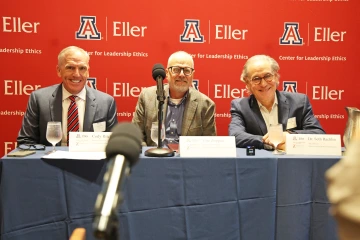Executive Ethics Symposium Explores the Ethical Debate Surrounding Extreme Weather, Insurance Practices, and Volatility of Home Insurance
Sept. 12, 2025
Image

The Eller College of Management Center for Leadership Ethics has been providing cutting-edge research, education and outreach for over two decades. The Center recently hosted its annual Executive Ethics Symposium at Hacienda Del Sol, bringing together Tucson community members to explore the ethical debate surrounding extreme weather, insurance practices, and volatility of home insurance.
Image

Panelists Cody Ritchie, Tom Zuppan and Seth Rachlin
Michael Fricke, professor of practice and associate director of the Center for Leadership Ethics, served as moderator for the discussion. Drawing on his expertise in ethics and leadership, Fricke engaged both the panelists and audience with meaningful dialogue and thoughtful questions. Panelists included Tom Zuppan, data analytics manager at the Arizona Department of Insurance and Financial Institutions; Cody Ritchie, CEO and managing partner at Crest Insurance Group; and Seth Rachlin, professor at Arizona State University’s School of Social and Behavioral Sciences. The discussion highlighted the growing tension between natural disasters, financial protection and ethical responsibility.
Zuppan provided an inside look at how insurance works in the United States, explaining that while homeowners’ policies often cover damages from fires, many exclude events such as earthquakes and floods. He noted that rates differ significantly—even between neighbors—because insurers must assess correlations between individual characteristics and potential losses. “Insurance in America is state-regulated,” he said, pointing out the complexities between states where insurance commissioners are appointed versus elected.
Ritchie expanded on that point, noting that in California, where the commissioner is elected, decisions can be driven by political considerations. “One of his goals is to get reelected,” Ritchie remarked, underscoring how leadership structures can influence the insurance landscape.
Rachlin drew attention to the rising costs of disasters, emphasizing that economic losses from natural disasters over the last 10 years are significantly higher than the previous decade. He noted that while 88% of homeowners now carry insurance—double the rate from 10 years ago—insurance companies often cover only a fraction of the financial toll. “When disaster strikes, insurance companies pay, but only for a piece of it, because the economic losses always exceed the insurable loss,” he explained.
The panel also tackled ethical questions surrounding responsibility. As Rachlin put it, “The first ethical question when there’s a problem is who’s responsible for causing it? The second is who’s responsible for fixing it?” The discussion emphasized that responsibility lies not only with insurance companies but with individuals and communities, encouraging people to consider how personal decisions—like checking the tides before sailing—can help prevent catastrophic losses.
The symposium was made possible with the support of Zanes Law, the event’s key sponsor for over a decade. Doug Zanes, chair of the Center for Leadership Ethics Board, provided opening remarks praising the event alignment with the Center’s mission of teaching young people the value of thoughtful decision-making. “Decisions are very complex and affect lots of people. The Center helps people understand that and take a step back to think before making decisions,” Zanes said. “What we’re trying to do is get young people to see how their decisions—whether business or personal—impact the community.”
Dr. Paul Melendez, University Distinguishes Outreach Professor and founder of the Center for Leadership Ethics, has championed these conversations for more than a decade, continually seeking timely and meaningful topics that advance thought leadership and foster in-depth discussion. As insurance companies cancel policies or raise premiums in response to climate-related risks, the symposium highlighted the pressing need to balance financial realities with ethical responsibilities. Ultimately, the conversation reinforced the Center’s mission: preparing the next generation to navigate difficult choices with clarity, accountability and foresight.
Video file

